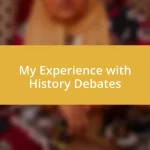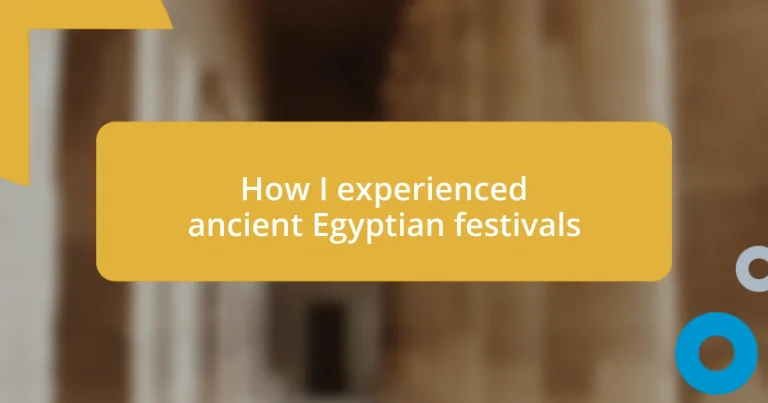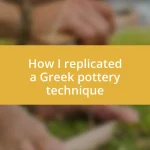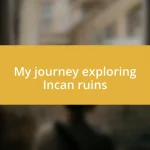Key takeaways:
- Ancient Egyptian festivals served as vibrant communal celebrations, fostering unity and gratitude tied to agricultural cycles and religious observances.
- Key festivals like Wepet-Renpet, Opet, and Inundation highlighted significant life events, symbolizing hope, joy, and appreciation for nature’s sustenance.
- Personal reflections on modern celebrations reveal how the essence of connection, shared experiences, and cultural traditions continues to resonate through time.
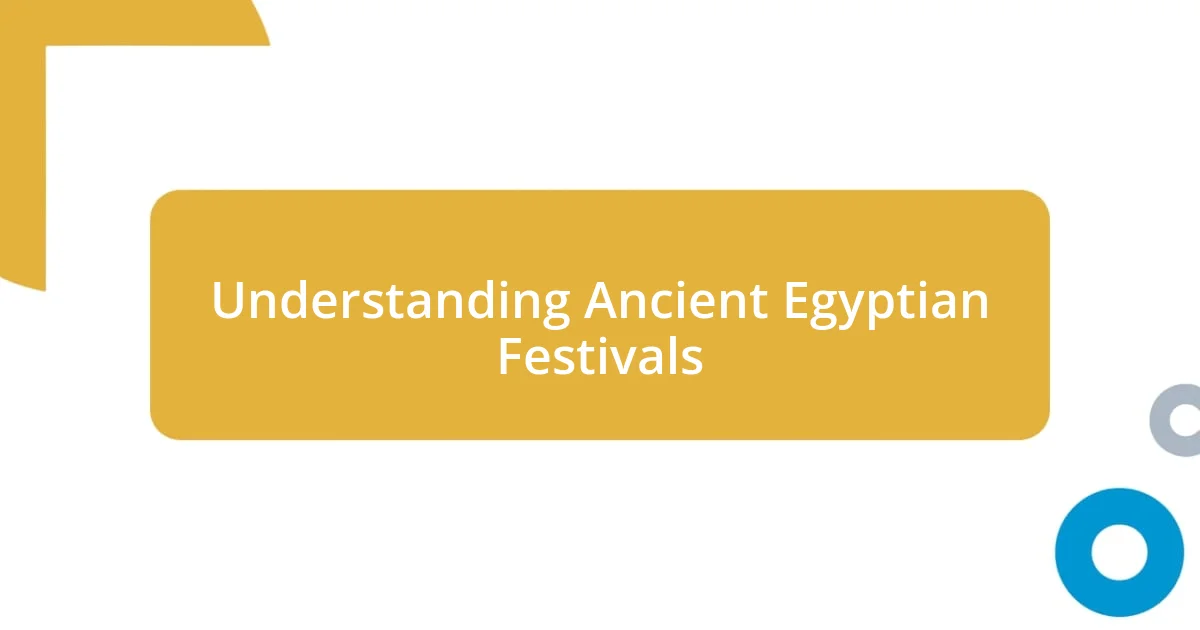
Understanding Ancient Egyptian Festivals
Ancient Egyptian festivals were vibrant, multi-faceted celebrations deeply tied to their rich cultural and religious tapestry. Imagine the sounds of music, the sight of colorful processions, and the aroma of exotic foods wafting through the air. This sensory explosion would invite everyone to participate in honoring deities and marking seasonal changes. Have you ever felt the energy of a lively festival? I remember attending a cultural festival one summer where the spirit of community and joy filled every corner; I imagine the same could be felt in ancient Egypt.
What struck me most about these festivals is their role as a community bond. People from all walks of life gathered in unison, forgetting daily struggles and celebrating together. They were not just about religious homage; they were a chance to share stories and create memories. Isn’t it fascinating how festivals can serve as a backdrop for both spirituality and connection? For instance, during the Opet Festival, the people would follow the processional barque of Amun through the streets, allowing for communal interaction and shared joy.
Through research, I learned that festivals were intertwined with agricultural seasons, reinforcing their importance in everyday life. The Inundation Festival celebrated the Nile’s annual flooding, which was critical for farming. This connection to the Earth evokes a sense of gratitude, doesn’t it? Reflecting on this aspect, I can relate it to modern harvest festivals, where we gather to give thanks for what the land provides. It’s a beautiful reminder of how humanity has always celebrated life’s cycles and the resulting bounty.
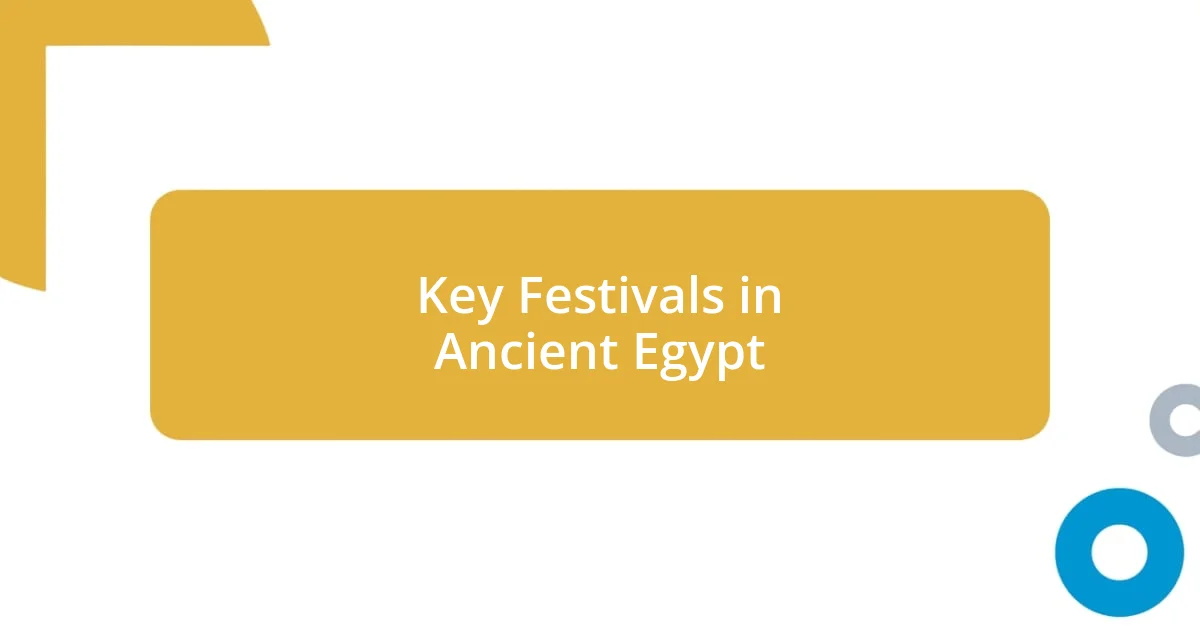
Key Festivals in Ancient Egypt
Key festivals in ancient Egypt were not just about religious observance; they were also about community and life itself. Each festival had its unique significance, attracting crowds eager to celebrate together. I think of the joy I felt at a local fair where families and friends came together to enjoy rides and games. In ancient Egypt, this sense of communal celebration was likely palpable during events such as:
- Wepet-Renpet (New Year Festival): A time for renewal and hope as people celebrated the start of a new agricultural cycle.
- Opet Festival: This grand event honored the god Amun and saw vibrant processions, allowing for shared joy among the people.
- Inundation Festival: Celebrating the Nile’s flooding, this festival held essential gratitude for the life-giving waters that sustained agriculture.
The vibrancy of these festivities reminds me of how sharing experiences can deepen connections. At one festival I attended, the laughter and cheers shared among strangers created a warm bond, echoing how ancient Egyptians must have felt reveling together in these monumental celebrations.
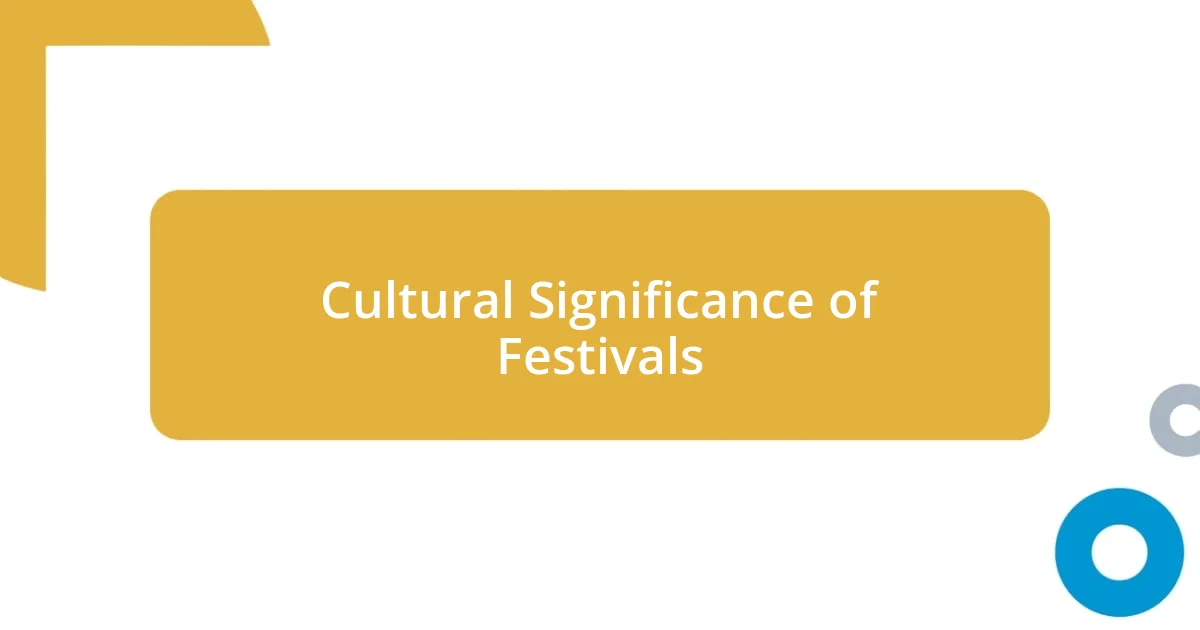
Cultural Significance of Festivals
The festivals of ancient Egypt held immense cultural significance, acting as both a celebration of deities and a manifestation of communal unity. I often think of how much I cherish moments of connection during local celebrations. It serves as a reminder that, just like the ancient Egyptians gathered for festivities, we too find joy in collective experiences that reinforce our bonds. Imagine families and friends sharing laughter, akin to the crowds of devotees in ancient temples, where every song and dance fortified the community’s spirit.
Another aspect I find fascinating is how these festivals mirrored the rhythm of life itself. Festivals weren’t merely events; they marked crucial agricultural and religious milestones. I recall a vibrant summer festival where the decorations mirrored the season’s bounty, much like the Egyptians did to honor the Nile’s gifts. This symbiotic relationship with nature shapes not only our celebrations but also our gratitude for the abundance that sustains us.
Interestingly, each festival served a unique purpose, creating a tapestry of tradition that defined Egyptian identity. Think of how our cultural celebrations today often revolve around significant life events or historical observances. Personally, I’ve attended a harvest festival that made me reflect on the Inundation Festival’s spirit of thanking the Earth for its blessings. Such connections across time remind us that the essence of celebration remains timeless, underscoring our shared humanity.
| Festival | Cultural Significance |
|---|---|
| Wepet-Renpet | Marks the New Year and renewal, representing hope and the start of the agricultural cycle. |
| Opet Festival | Honors the god Amun, promoting communal joy through vibrant processions. |
| Inundation Festival | Celebrates the Nile’s flooding, emphasizing gratitude for the life-sustaining waters. |
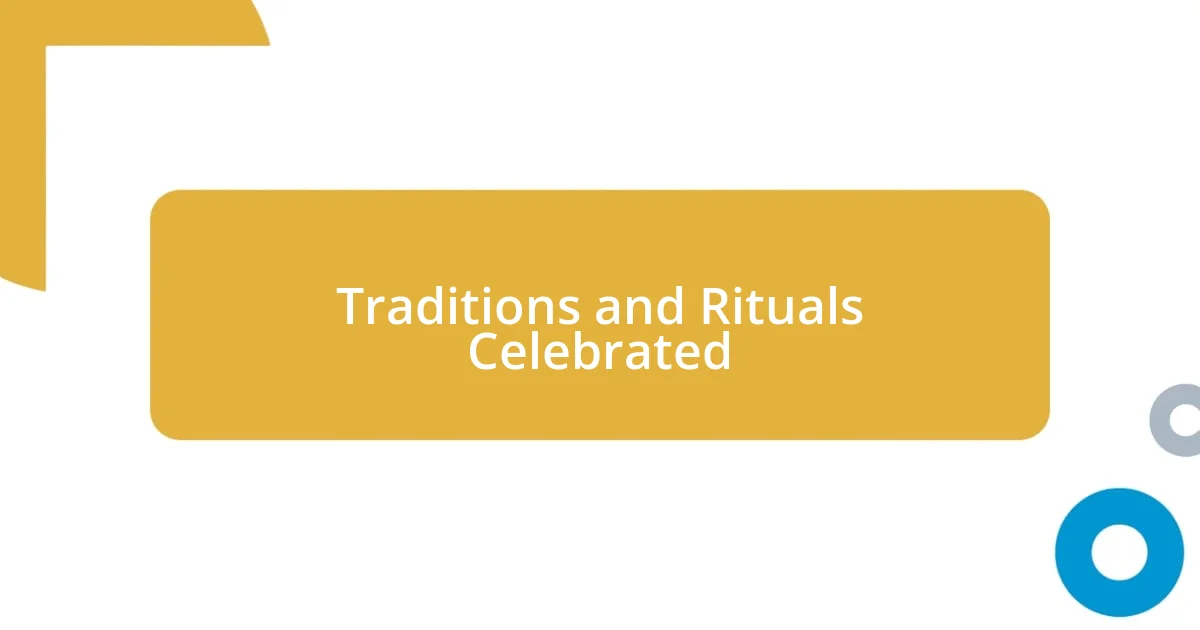
Traditions and Rituals Celebrated
The traditions and rituals celebrated during ancient Egyptian festivals were truly remarkable. I remember attending a colorful parade where the air was filled with music, laughter, and the aroma of street food. It makes me wonder how the Opet Festival must have felt, with its vibrant processions reclaiming the streets, echoing the heartbeat of the city as people honored Amun together. The joy must have been contagious, as entire communities came together in a shared expression of gratitude and celebration.
During the Wepet-Renpet festival, people would offer prayers for prosperity while decorating their homes with fresh flowers and food. It reminds me of a time I helped organize a local harvest festival, where every decoration represented the fruits of hard work and unity. That communal effort made me think about how ancient Egyptians must have felt, carefully preparing for their own New Year, filled with hope for the agricultural cycle ahead. Celebrations like these foster a deep sense of belonging, a shared experience that transcends time.
Another striking ritual was the Inundation Festival, where the Nile’s life-giving floods were acknowledged with heartfelt gratitude. I often feel a sense of wonder at how much we take for granted in our lives, and I imagine the people of ancient Egypt standing by the river, offering their thanks. It’s like when we gather around a table for Thanksgiving, reflecting on what sustains us, creating a deep emotional bond. Isn’t it incredible how such celebrations connect us to our past and remind us of the blessings we continue to receive?
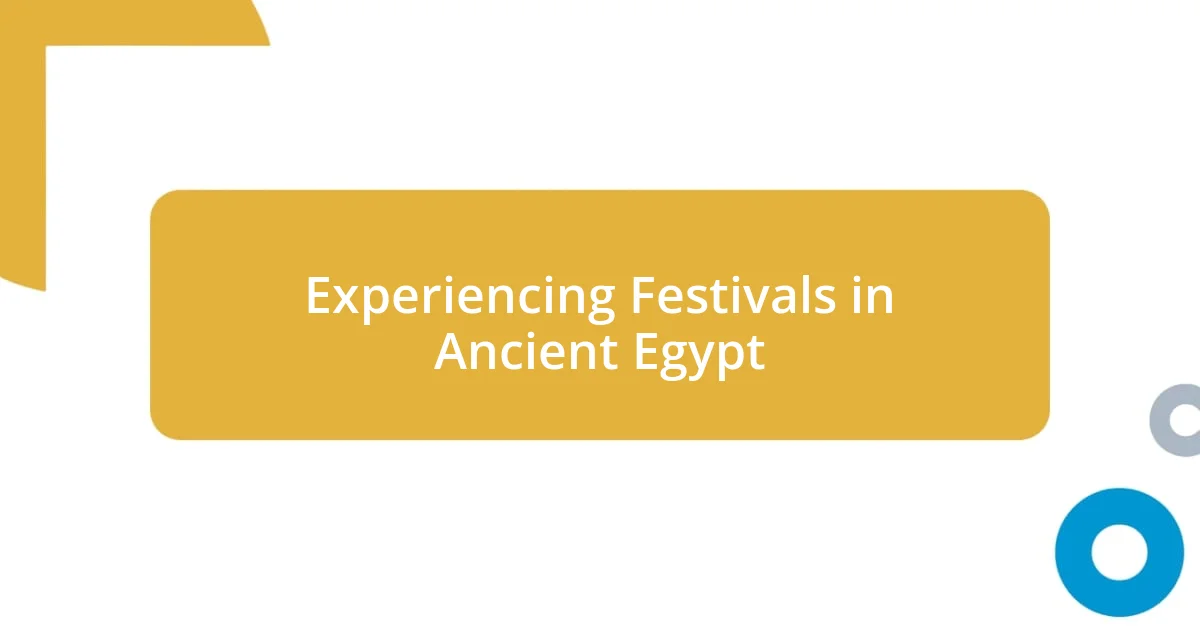
Experiencing Festivals in Ancient Egypt
Experiencing the festivals of ancient Egypt was like stepping into a vibrant tapestry of life. I can almost feel the energy in the air during the Opet Festival, where the streets would burst into color as people danced and celebrated together. The sense of unity must have been palpable, as families came together, reveling in the shared joy that filled every corner of their community. I often think about how similar gatherings today can evoke that same spirit, reminding us how essential connection is to our happiness.
When I reflect on the rituals of the Wepet-Renpet festival, I am filled with a sense of nostalgia. Imagine the joy of decorating homes with fresh flowers, symbolizing hope for a new year. I remember organizing a small community event where we transformed a park into a realm of celebration. It felt profoundly rewarding to witness the smiles and laughter that emerged simply from shared effort and hope. I can only imagine how the ancient Egyptians must have felt, their hopes intertwined with each vibrant blossom that heralded the promise of abundance.
Then there was the Inundation Festival, a poignant reminder of gratitude and life’s essential sustenance. I often find myself in moments of reflection, akin to the ancient Egyptians at the Nile’s banks, giving thanks for the simple blessings that nourish us. The powerful connection to nature we felt became a daily ritual for them, much like the gratitude I try to cultivate in my life. How can we not appreciate the life-sustaining gifts around us? These ancient celebrations are not merely historical events; they resonate in our souls today, encouraging us to acknowledge and cherish the abundance we often overlook.
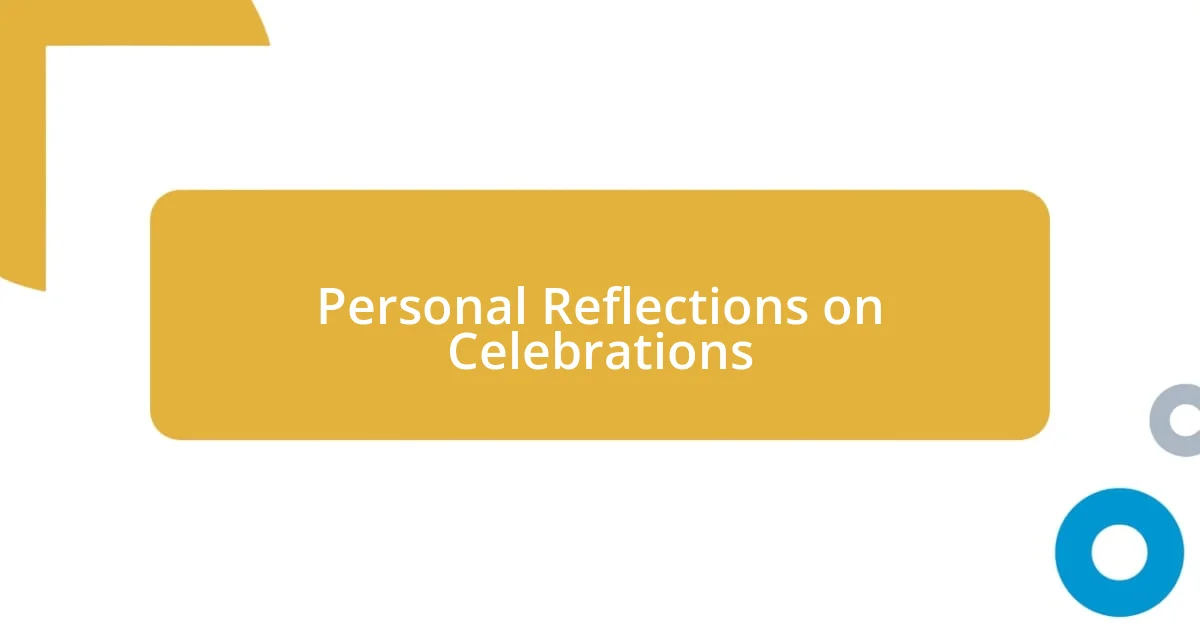
Personal Reflections on Celebrations
Reflecting on celebrations brings to mind a warmth that’s hard to describe. I recall a vibrant community potluck where everyone contributed their favorite dishes. The laughter and spirited conversations mirrored the festival atmosphere of ancient Egypt. It’s fascinating how food acts as a bridge, connecting generations and cultures. Could it be that such gatherings serve the same purpose today as they did thousands of years ago, fostering bonds and memories that excite the soul?
During one festive gathering, I assisted in crafting homemade decorations to adorn the space. Each bright paper flower felt like a little echo of the Wepet-Renpet festival, where the past and present intertwined through heartfelt creations. As I watched children play amidst the decorations, I pondered how ancient Egyptians may have felt, pouring love into their homes, anticipating a year filled with hope. Isn’t it a beautiful thought that the essence of these celebrations, rooted in joy and togetherness, spans across time?
There’s an intimacy in communal celebrations that lingers long after the events conclude. I recently attended a local music festival that brought together an eclectic mix of artists and cultures. The energy in the air mirrored that of the Inundation Festival, where gratitude flowed freely and the rhythm of life pulsed through the crowd. Standing there, surrounded by diverse souls united in joy, I couldn’t help but wonder — do we realize how similar our experiences are to those of ancient peoples? It’s in these moments of connection that I truly feel intertwined with a shared human experience, rich with history and future possibilities.
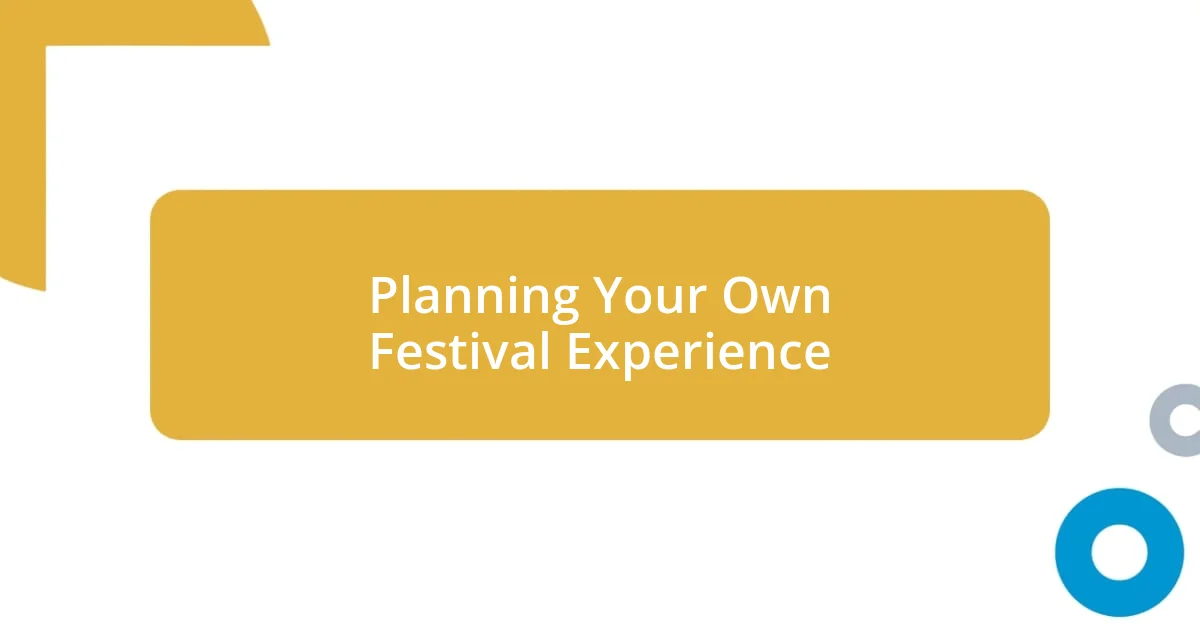
Planning Your Own Festival Experience
Planning a festival experience can be incredibly fulfilling, especially when you draw inspiration from ancient traditions. I remember coordinating a neighborhood festival where we celebrated the changing seasons. By incorporating local music, art, and food, we created an environment that felt electric. Isn’t it fascinating how the energy of celebrations can transform a simple gathering into something extraordinary?
To make your festival truly memorable, think about the details that resonate with your community. I once took part in a small event where we encouraged everyone to wear traditional costumes inspired by different cultures. The joy on people’s faces while interacting and sharing stories reminded me of the unifying spirit observed during the Opet Festival. How can you harness that same enthusiasm in your own planning?
Engaging the senses is essential for any festival experience. I vividly recall a candlelight vigil I organized, where we invited participants to bring their favorite snacks to share. The warm glow of the candles mixed with the delightful aroma of food created an atmosphere ripe for connection. Reflecting on this, I realize that each sight, sound, and taste can weave a richer narrative for your celebration. So, what will your festival say about your community’s spirit?










